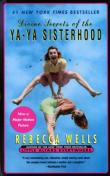BKMT READING GUIDES
Divine Secrets of the Ya-Ya Sisterhood: A Novel
by Rebecca Wells
Paperback : 368 pages
20 clubs reading this now
19 members have read this book
When Siddalee Walker, oldest daughter of Vivi Abbott Walker, Ya-Ya extraordinaire, is interviewed in the New York Times about a hit play she's directed, her mother gets described as a "tap-dancing child abuser." Enraged, Vivi disowns Sidda. Devastated, Sidda begs forgiveness, and ...
Introduction
(
When Siddalee Walker, oldest daughter of Vivi Abbott Walker, Ya-Ya extraordinaire, is interviewed in the New York Times about a hit play she's directed, her mother gets described as a "tap-dancing child abuser." Enraged, Vivi disowns Sidda. Devastated, Sidda begs forgiveness, and postpones her upcoming wedding. All looks bleak until the Ya-Yas step in and convince Vivi to send Sidda a scrapbook of their girlhood mementos, called "Divine Secrets of the Ya-Ya Sisterhood." As Sidda struggles to analyze her mother, she comes face to face with the tangled beauty of imperfect love, and the fact that forgiveness, more than understanding, is often what the heart longs for.
Divine Secrets of the Ya-Ya Sisterhood may call to mind Prince of Tides in its unearthing of family darkness; in its unforgettable heroines and irrepressible humor and female loyalty, it echoes Fannie Flagg's Fried Green Tomatoes at the Whistle Stop Cafe.
Excerpt
Tap-dancing child abuser. That's what The Sunday New York Times from March 8, 1993, had called Vivi. The pages of the week-old Leisure Arts section lay scattered on the floor next to Sidda as she curled up in the bed, covers pulled tightly around her, portable phone on the pillow next to her head. ...Discussion Questions
1. Wells uses three quotations as epigraphs for the novel. Why might she have chosen the first two, which address the need for spiritual growth and love? What connection, might there be between the "unknowable" that sits there "licking its chops" and our need for spiritual growth and love?2. While Vivi was not a perfect mother, Wells does not blame her as a mother. Discuss the concept of the "good enough" mother and what acceptance of that concept means to a woman's acceptance of self.
3. One of the dominant motifs in the novel focuses on the contrast between the spirit and the law. Sister Solange and Sister Fermin take very different approaches to teaching Vivi. The Ya-Yas and Buggy have very different ideas as to what makes a statue of the Virgin Mary beautiful. The Ya-Yas and the Catholic Church have very different ideas as to where Genevieve can be buried. And, on one occasion, Vivi thinks that "Sometimes higher laws than Thornton's must be obeyed." To what higher laws is Vivi referring? Do those higher laws have any connection with the conflict that Wells seems to see between the spirit and the law?
4. Religious imagery abounds in the novel. The young Ya-Yas prick their fingers and drink each other's blood and experience a communion. Sidda baptizes herself. Why might Wells rely so heavily on religious imagery to describe everyday experiences?
5. One of the themes of the novel is the necessity of and the difficulty of personal growth. For instance, Sidda must remind herself and be reminded that she is a "grown up." Which characters in the novel experience personal growth? What obstacles must those characters overcome in order to grow? How do those characters that grow overcome the obstacles that stand in their way?
6. Is there any special significance that can be attached to the fact that Wells ends her novel with a marriage?
7. Vivi is a tangled, charismatic, and haunted character. How much does the culture Vivi grew up in influence her? Does a woman face special problems when she grows up in the South during the 1940's? Look closely at Margaret Mitchell's Gone with the Wind to see how it influenced Vivi's idea of who she was. In what way might "being a lady" pose problems for Vivi, her friends, and their daughters?
8. Why does Wells switch back and forth between the present (Sidda's current life) and the past (Vivi's youth and early motherhood)? What might Wells be suggesting about mothers and daughters?
9. "The Holy Lady" appears at the beginning and at the end of the novel. Discuss her presence in the book and what Wells might be suggesting with such inclusions.
10. What role does humor serve throughout the novel? Discuss how closely Wells weaves humor and pathos.
Book Club Recommendations
Recommended to book clubs by 2 of 2 members.
Book Club HQ to over 88,000+ book clubs and ready to welcome yours.
Get free weekly updates on top club picks, book giveaways, author events and more








